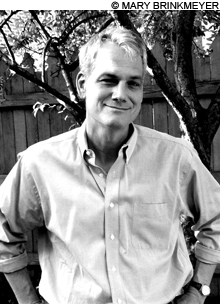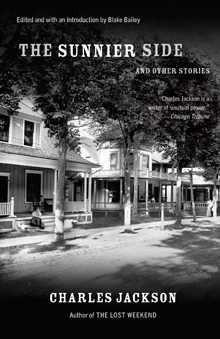
Blake Bailey |
The title The Sunnier Side is ironic in a way we have forgotten irony can be, tinged with bitterness and regret instead of just smarmy and superior. The stories are set in Arcadia, the central–New York township that includes Jackson's hometown of Newark. Writers — Capote, Didion, Janet Malcolm, to name a few — are given to making self-justifying statements about how writers inevitably betray. I've never read anything that so relentlessly ties that betrayal to an almost childish need to win approval. Jackson returned to Arcadia throughout his life, eager to be acclaimed. When he died, not one of his books was in the local library. It's not hard to understand that neglect. Bailey's biography reveals that Jackson's stories were transmutations of real scandals — such as the gifted local musician who was known but not acknowledged to be molesting boys in the town, as he did Jackson and his brother. "Palm Sunday," one of the most brilliant stories in the collection, is a remarkable exposition of a young man's confusion and guilt, even excitement, and of how vivid, if slightly ridiculous, the experience is to the grown man.It's the title story, though, that summarizes the conflicting impulses here. It begins with a letter to Jackson (based on an actual letter he received) from a resident of his hometown praising a story he published for being so free of dirt and neuroses. The rest of the story is Jackson's response, in which he spells out the fates of this woman's three girlhood friends, the scandals that surrounded them — not the sort of things good, decent people, like his correspondent, wish to hear about.
 |
All of Jackson's characters were recognizable to Arcadia residents as real people, including the woman whose letter inspired "The Sunnier Side." There is a juvenile urge to cruelty in the story, an impulse to play the part of the truth teller. But there is also compassion, and you know that for Jackson the beauty and kindness of these women has never faded. Taken together, The Sunnier Side evokes not a more-literary Grace Metalious, but something closer to the David Lynch of Blue Velvet. Not that there is anything surreal here. But like Lynch, Jackson is not saying small-town life is a lie. The beauty and peace of it exists side by side with the sordidness, and neither negates the other. Jackson owns up fully to the warring impulses of the writer: the urge to betray, as well as the fond look back.THE LOST WEEKEND | By Charles Jackson :: Vintage Books :: 272 pages :: $15
THE SUNNIER SIDE AND OTHER STORIES | By Charles Jackson :: Vintage Books :: 304 pages :: $15
FARTHER & WILDER: THE LOST WEEKENDS AND LITERARY DREAMS OF CHARLES JACKSON | By Blake Bailey :: Alfred A. Knopf :: 496 pages :: $30
 Related
Related:
Generation gap, John McCain's economic philosophy, Twitheads, More 
- Generation gap
It’s an uneven show with a dour vision that leaves a mediciny taste in your mouth — and, I think, offers signs of a generation gap among curators.
- John McCain's economic philosophy
Big Fat Whale
- Twitheads
Is Twitter bad for journalism?
- Opening pitch
The most moving moment of this year’s Boston Symphony Orchestra opening gala came before the concert started — the standing ovation for James Levine, who looked rested and recuperated after his kidney surgery this summer, an operation that forced him to cancel most of his Tanglewood season.
- Peter Bjorn and John | Seaside Rock
It’s really pointless. And somewhat nice.
- Mobile-home game
The intersection of Brookline Avenue and Lansdowne Street, in the hours before, during, and after a Red Sox game, is not unlike a trading floor on pre-crash Wall Street: it’s chaotic, teeming with people, and everyone’s trying to make a buck.
- Is John McCain crazy?
There is something not quite right about John McCain.
- Sweet release
I don’t want to waste your time waxing philosophical about the problematic logic behind qualifying music “good” or “bad,” much less pontificating on whether “sophisticated punk” is an oxymoron.
- Saving Marriage
Roth and Henning, dedicated partisans, were everywhere with their cameras in those historic years 2003–2006.
- Living la vida Republican
Trying to find college Republicans in Boston is like looking for a flattering pair of jeans: they’re elusive — either too stiff or completely out of style.
- Filth and Wisdom
As the lead character narrates his “filthy” story, and those of his London flatmates/neighbors, we hit upon boredom long before wisdom can arrive.
- Less

 Topics
Topics:
Books
, Malcolm Lowry